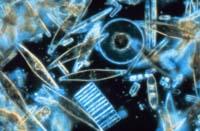Open ocean debate
Its name indicates well the core of the project: Driven by India and Germany, its goal is sea fertilization. Specifically, the ship has 50 scientists from several European countries, one French and two Spanish, Chilean and Indian, whose objective is to analyze the consequences of fertilizing the sea with iron sulfate.

Phytoplankton, when growing, takes dissolved carbon dioxide into the water. (Photo: NOAA)
Such experiments are not authorized. Some scientists believe that sea enrichment in iron can help combat climate change. In fact, phytoplankton, the set of microscopic plants that are part of plankton, needs iron to grow, so when there is a lot of iron it increases. Growing up it takes the carbon dioxide present in the water and turns it into organic matter. On the other hand, carbon dioxide in the water is in balance with that of the atmosphere, so as phytoplankton takes carbon dioxide, the atmospheric content passes to the sea. Thus, the concentration of carbon dioxide in the atmosphere decreases. Therefore, some scientists believe that the momentum of the process can be useful to combat climate change.
However, carbon dioxide converted into organic matter by phytoplankton does not necessarily remain in the sea. If this organic matter sinks and reaches 3,000 meters deep, carbon dioxide is trapped for centuries. On the contrary, if instead of sinking, microorganisms and small marine animals ingest phytoplankton, carbon dioxide will be released into the atmosphere.
Therefore, it is not clear whether the fertilization of the ocean with iron could benefit the climate. Moreover, some researchers believe that such experiments endanger the balance between marine living beings and can cause great damage to the marine ecosystem.
Just in case...
In fact, in the last fifteen years some experiments have been conducted, but since they have not reached clear conclusions, the United Nations decided last year to suspend such experiments. The decision was made at the meeting of the Convention on Biological Diversity and was signed by 191 countries. Among them were not the United States, but Germany.
For many, the LOHAFEX project breaks this agreement. There is an exception in the agreement that allows small fertilization experiments on the coast. The current one, however, is neither coastal nor small: It will develop in open sea to the southeast of the Atlantic and will consist of the emission of six tons of iron sulfate in an area of 300 square kilometers.
According to the researchers who lead the experiment, the objective is to measure the organic particles that sink and analyze their influence on small marine crustaceans (krill). In fact, in the area of experimentation krill has been reduced by 80%, main food for whales, penguins, seals and other marine species.
For many, however, the experiment is not acceptable and the German Environment Minister himself has asked for his withdrawal. However, the project managers go ahead with their intention. Time will show how the matter will end. In any case, it has been revealed that behind the issue of climate change there are great interests, so it is logical to think that this debate will not be the last.
Published in Gara
Buletina
Bidali zure helbide elektronikoa eta jaso asteroko buletina zure sarrera-ontzian











